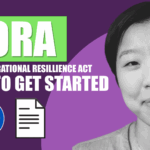In this episode, we explore the evolving threats to election security and integrity, from AI-generated content and misinformation about voter trust to tech companies’ responsibilities and cybersecurity’s role in safeguarding democratic processes. The conversation also explores current and future challenges and actionable solutions to counteract misinformation, ultimately aiming to restore public confidence in election systems.
Our Guests:
- Tanya Janca: A renowned cybersecurity expert, Tanya, known as SheHacksPurple, is the best-selling author of Alice and Bob Learn Application Security and Cards Against AppSec. With 28 years in IT, she has trained thousands of developers and security professionals globally.
- Julie Tsai: Julie, a six-time CISO and SecDevOps expert, brings experience from startups to major corporations, including Roblox. She advises startups, serves on the Bay Area CSO Council, and teaches cybersecurity at Merritt College.
- Nick Judd: As a lead research engineer at the Digital Safety Research Institute, Nick focuses on digital safety, including misinformation, privacy, and cybersecurity, making him a key voice on information integrity.
Key Takeaways:
- Growing Misinformation Threats: AI-generated content and deepfakes are increasingly used to spread misinformation, making it harder for voters to trust online information about elections. Awareness and media literacy are essential to counter this trend.
- Voter Trust and Misinformation: Effective counter-misinformation campaigns can help mitigate uncertainty and restore trust, emphasizing verified sources and transparency in information flow.
- Tech Company Responsibility: Tech companies play a crucial role in reducing the spread of disinformation. Suggested actions include watermarking AI-generated content and authenticating human-generated media.
- Regulatory and Educational Initiatives: There’s a call for civic responsibility, with educational efforts to raise awareness about potential threats and initiatives to track AI use by organizations that might influence public opinion.
- Looking Ahead to Future Elections: Systemic improvements and technological advances are critical as election security challenges evolve. Enhanced transparency, faster processes, and public education are vital for building a resilient democratic process.


